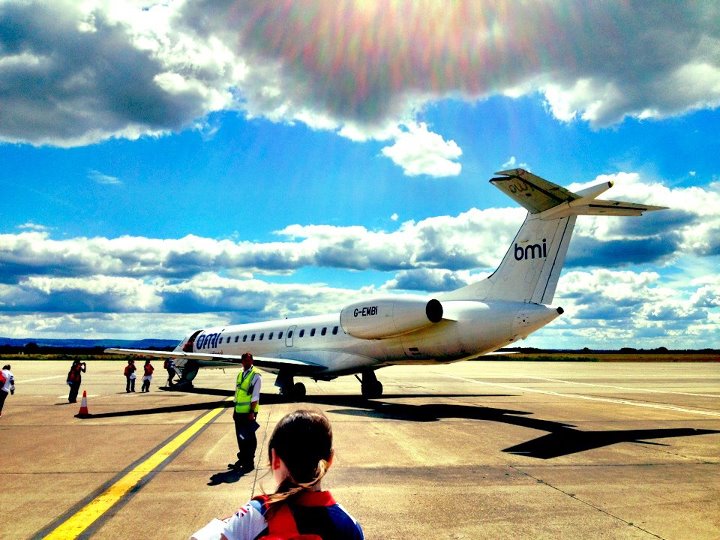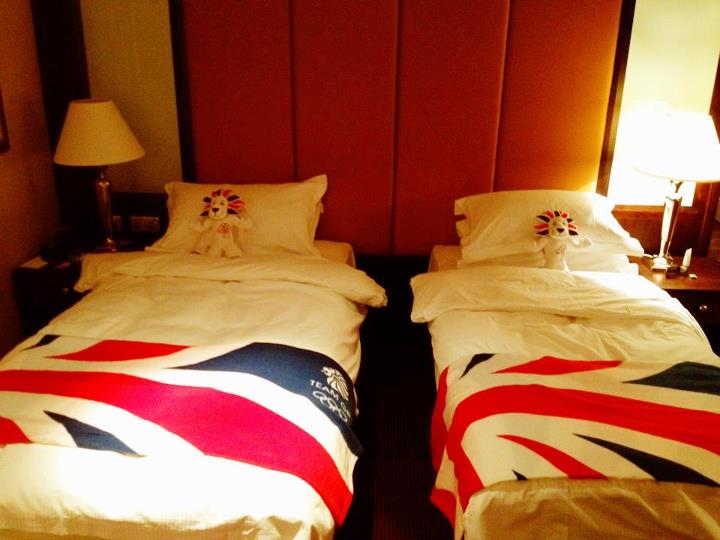 Being at the Village was an eye opening experience. In hindsight, I am glad we got our bearings before we played Brazil. Most of us made the best of the evening and headed over to “the globe” to shoot some pool and hang out after meetings and meals. This place looked like it was straight out of the film “Roadhouse,” it was filled with neon lights, pool tables, a few XBOX, and Wii consoles, bandstands, a digital jukebox, and a Powerade bar where you could customize your own Powerade bottle and name bands. Quite a lot of athletes were tweeting their custom bottles, using hashtags and all sorts of mentions. I felt that social media outlets were well used throughout the Olympics and almost all of the interactions I saw were very positive. I even used the search feature a few times to find other athletes, where they were competing, how they did and send them well wishes. Team GB Women’s Football was constantly connected throughout the games, most of the staff were on Twitter and constantly posted updates, results and more good luck messages. Our time in the Village was brief; we very much enjoyed it but were were soon back to business as we had a pre-Olympic match to prepare for. So off we went to Middlesborough following morning.
Being at the Village was an eye opening experience. In hindsight, I am glad we got our bearings before we played Brazil. Most of us made the best of the evening and headed over to “the globe” to shoot some pool and hang out after meetings and meals. This place looked like it was straight out of the film “Roadhouse,” it was filled with neon lights, pool tables, a few XBOX, and Wii consoles, bandstands, a digital jukebox, and a Powerade bar where you could customize your own Powerade bottle and name bands. Quite a lot of athletes were tweeting their custom bottles, using hashtags and all sorts of mentions. I felt that social media outlets were well used throughout the Olympics and almost all of the interactions I saw were very positive. I even used the search feature a few times to find other athletes, where they were competing, how they did and send them well wishes. Team GB Women’s Football was constantly connected throughout the games, most of the staff were on Twitter and constantly posted updates, results and more good luck messages. Our time in the Village was brief; we very much enjoyed it but were were soon back to business as we had a pre-Olympic match to prepare for. So off we went to Middlesborough following morning.
We made our way Stratford Station ,directly across from the village and after multiple security screenings we were joined by Team GB Men’s football. Police escorted us to Kings Cross where we boarded our first class train to Middlesborough. Ooh la la. We were all left to our own devices, I filled up my time editing video and scarfing my sandwich whilst most of the others tweeted, “facebooked,” napped or watched movies on their iPads and computers. I had never been in a first class cabin on a train before so I was a bit surprised when the attendants came around with the trolley and gave us a selection of snacks to chose from, as I eluded to earlier I had a sandwich and the attendant asked how many I wanted. I thought we only got one, that’s first class for you – an unlimited supply of sandwiches.
After a short coach journey we arrived at a rather palatial hotel, it was absolutely massive – gorgeous. The corridors were decorated with ornate filigree, antique paintings, bold carpeting and our rooms were enormous with all of the accoutrements and even a fancy turn down service (I could get used to this). There was a golf course on the grounds as well as Middlesborough’s training ground – immaculate pitches. The staff were all obliging and lovely and even took us on a few guided golf buggy tours, lucky us. As the week went on we had a few open training sessions; media and supporters came to watch – we enjoyed that immensely!
 Before we knew it match day was upon us. This day in particular was a bit of a rush due to the doubleheader’s early kickoff but regardless we were eager to get started. The excitement was palpable, it had been building for a few weeks now and it was finally time to warm up and play. The match ended in a goal less draw but there were a lot of positives to take away from our performance. We had many opportunities but failed to convert, all things considered it was a pretty good start to our Olympic campaign. Not bad for a team that had only been together for two weeks. After the match we headed back to the changing rooms for ice baths and showers but not before taking some photos and signing autographs for our awesome supporters. One thing the team really enjoyed about Twitter and Facebook was seeing the photos that people took at the match and mention the enjoyment it brought to them. It was nice to feel supported, especially when everyone’s comments were so positive!
Before we knew it match day was upon us. This day in particular was a bit of a rush due to the doubleheader’s early kickoff but regardless we were eager to get started. The excitement was palpable, it had been building for a few weeks now and it was finally time to warm up and play. The match ended in a goal less draw but there were a lot of positives to take away from our performance. We had many opportunities but failed to convert, all things considered it was a pretty good start to our Olympic campaign. Not bad for a team that had only been together for two weeks. After the match we headed back to the changing rooms for ice baths and showers but not before taking some photos and signing autographs for our awesome supporters. One thing the team really enjoyed about Twitter and Facebook was seeing the photos that people took at the match and mention the enjoyment it brought to them. It was nice to feel supported, especially when everyone’s comments were so positive!
After a lie in, breakfast and a recovery session we packed up and made our way to one of Middlesborough’s local airports. Much to our surprise a private jet awaited our arrival. We breezed through security, had a browse in W.H. Smith and boarded the plane to Cardiff; where we had the honor of kicking off the London 2012 Olympic Games.